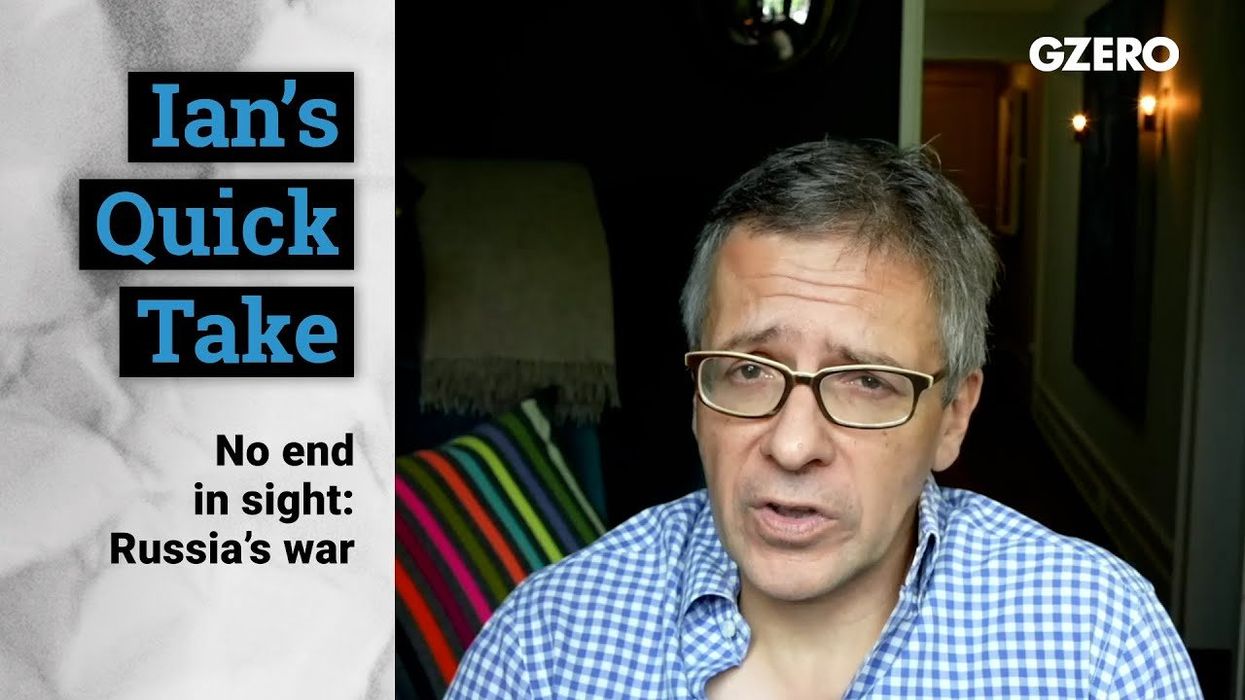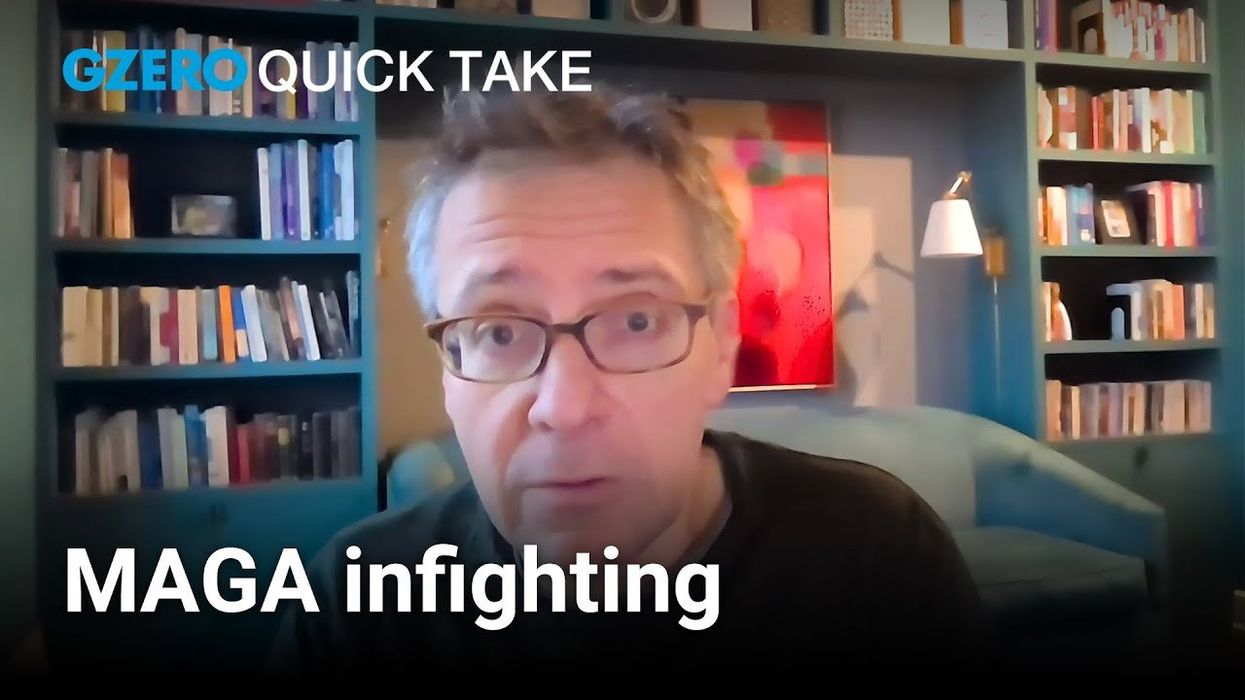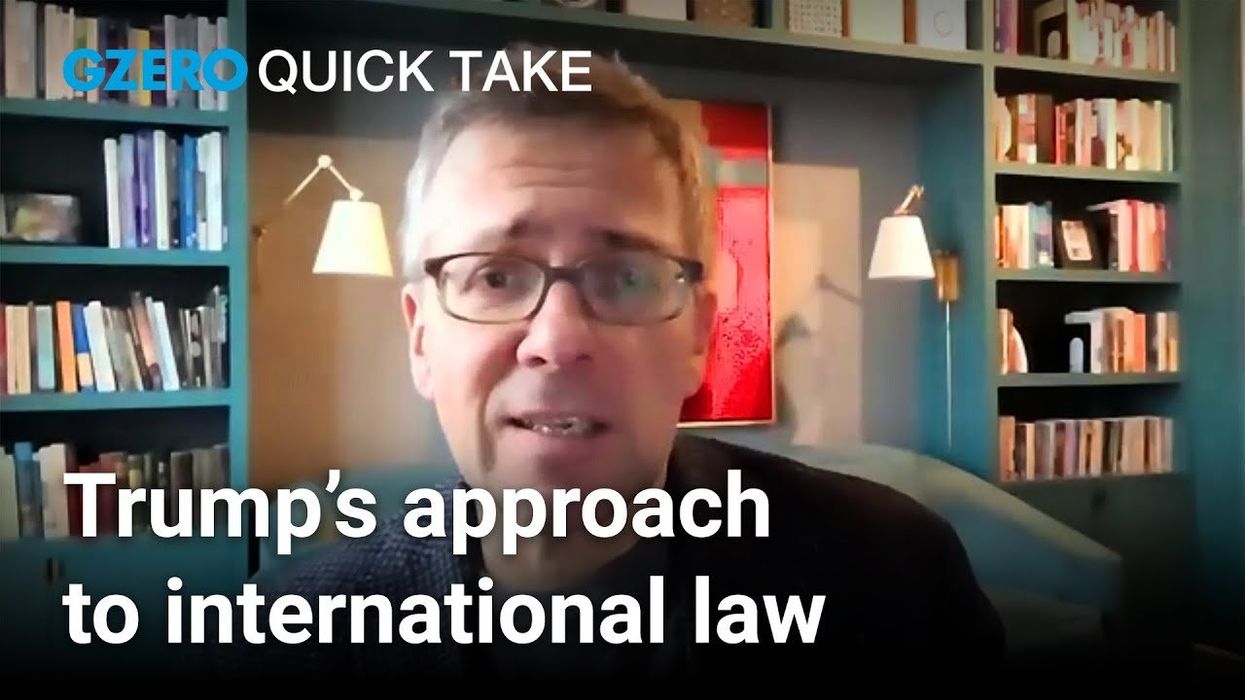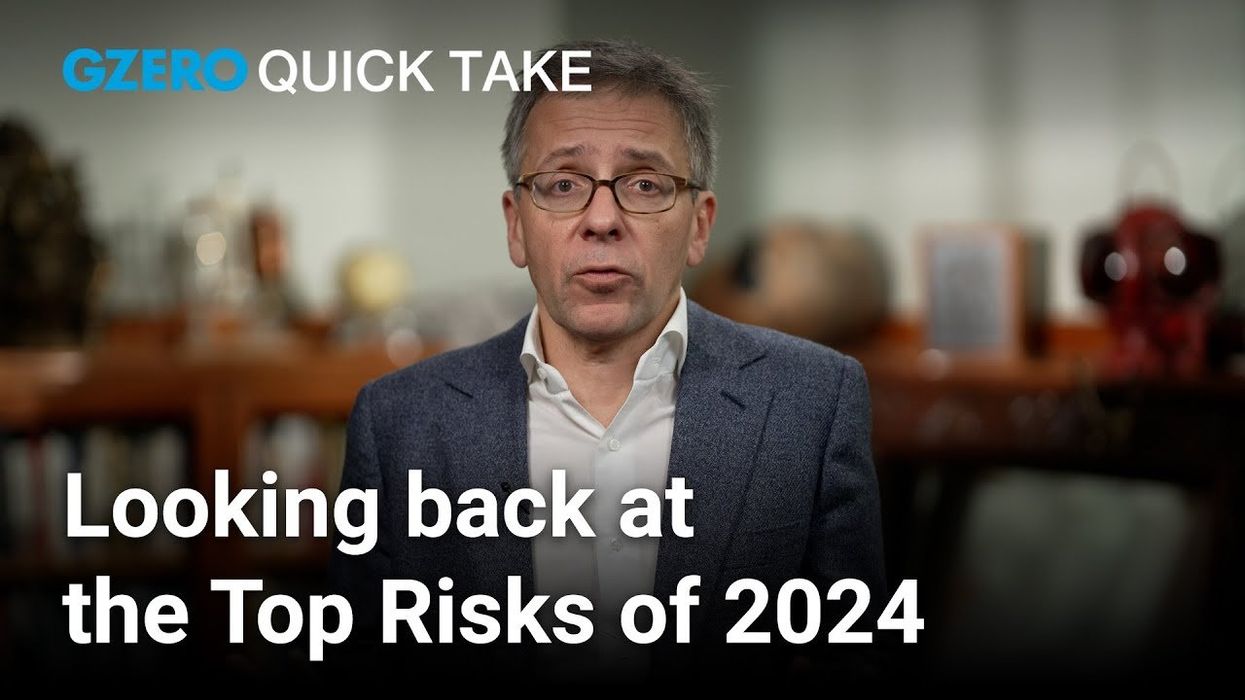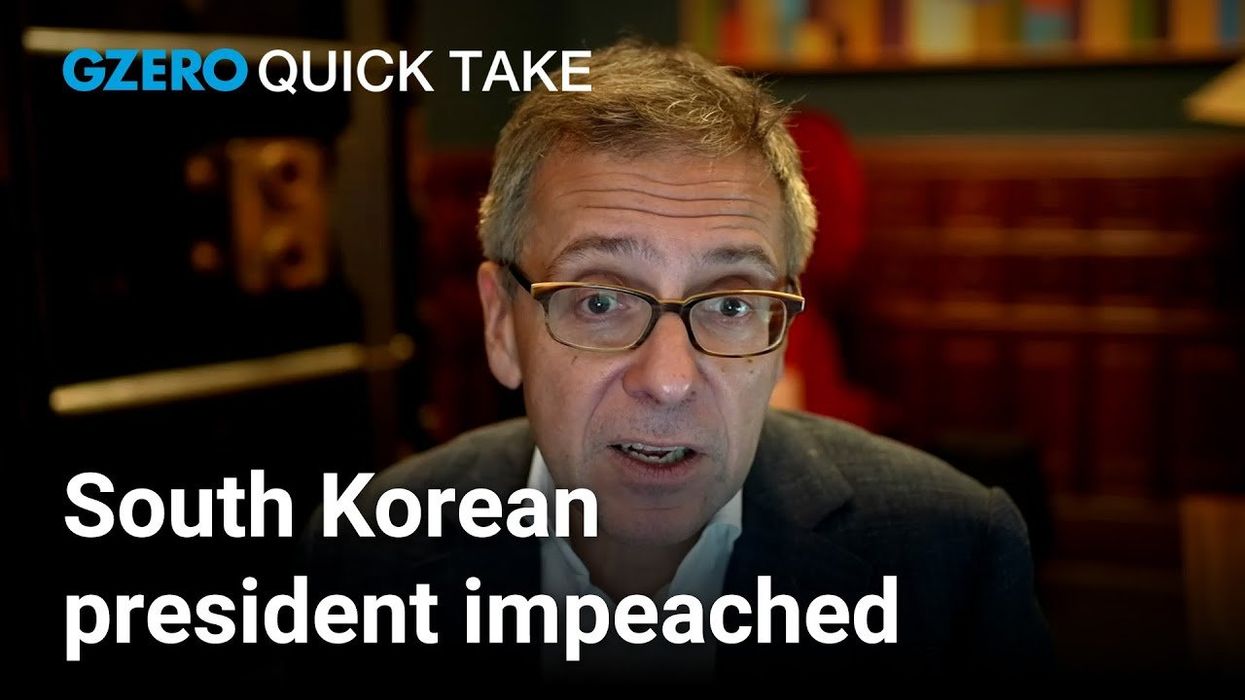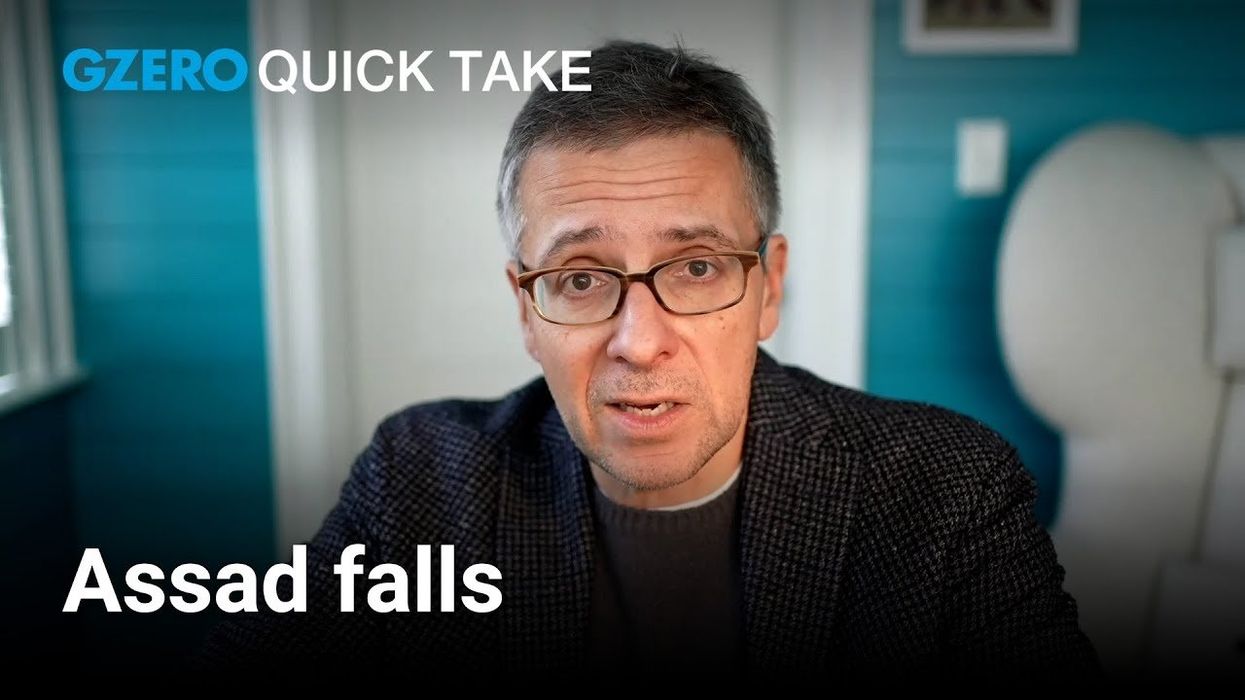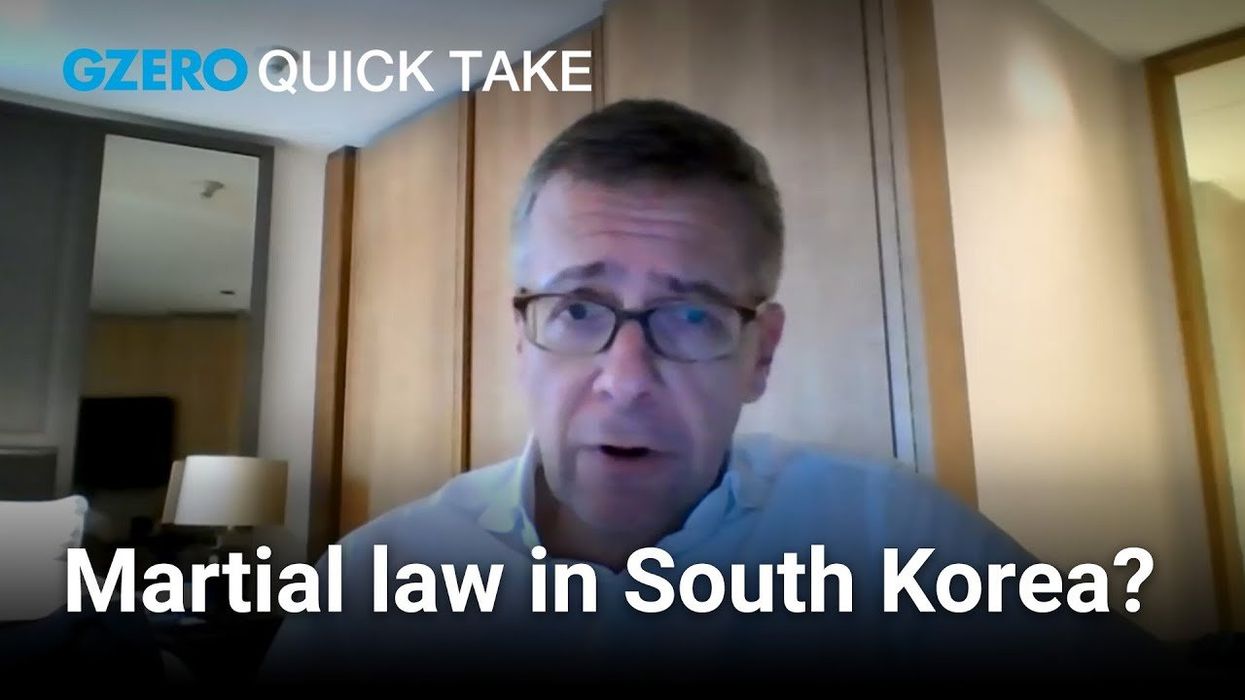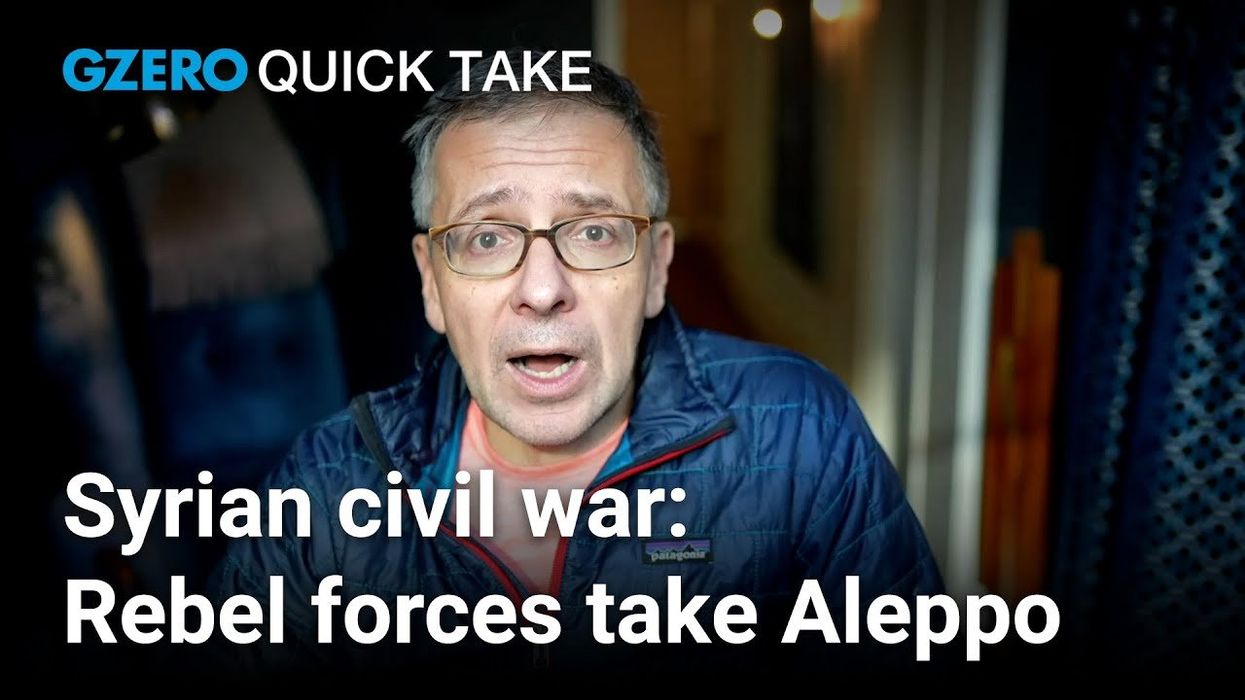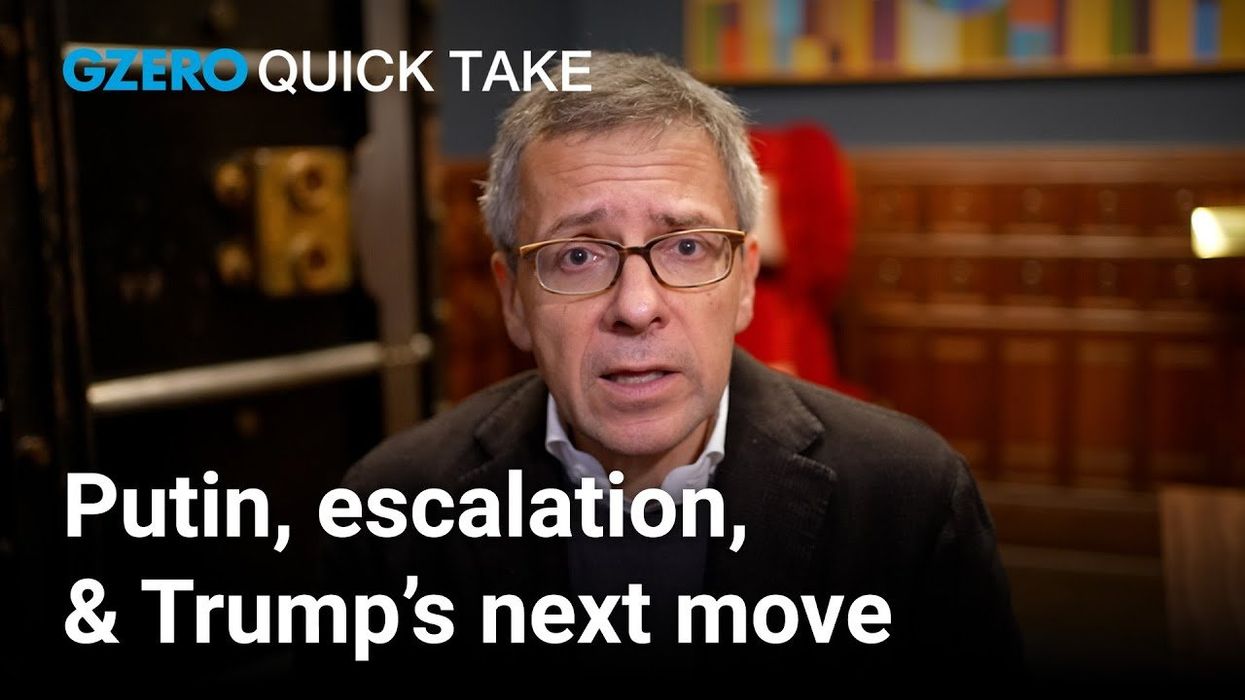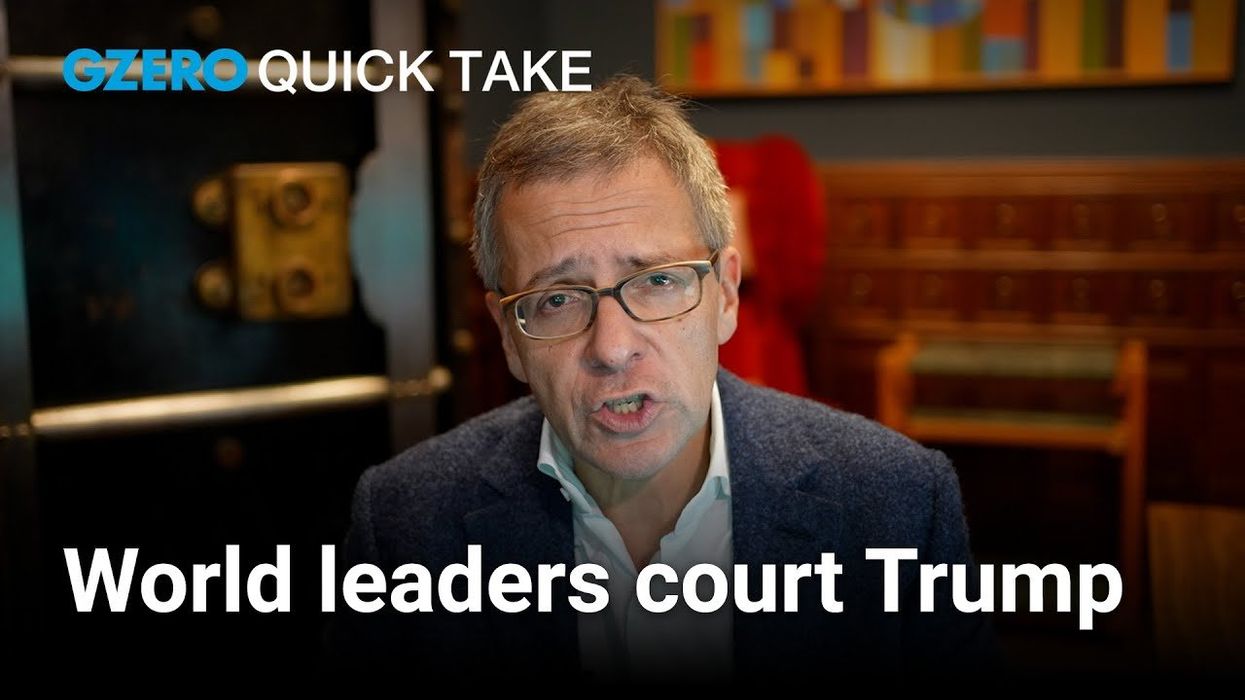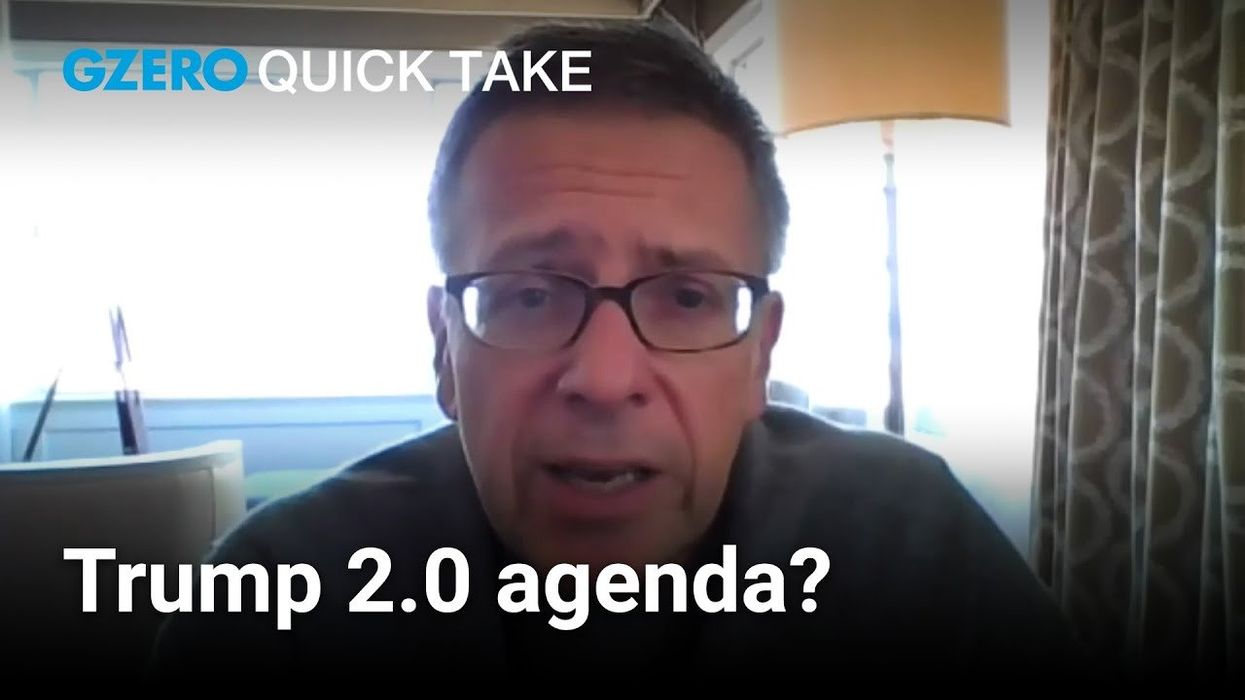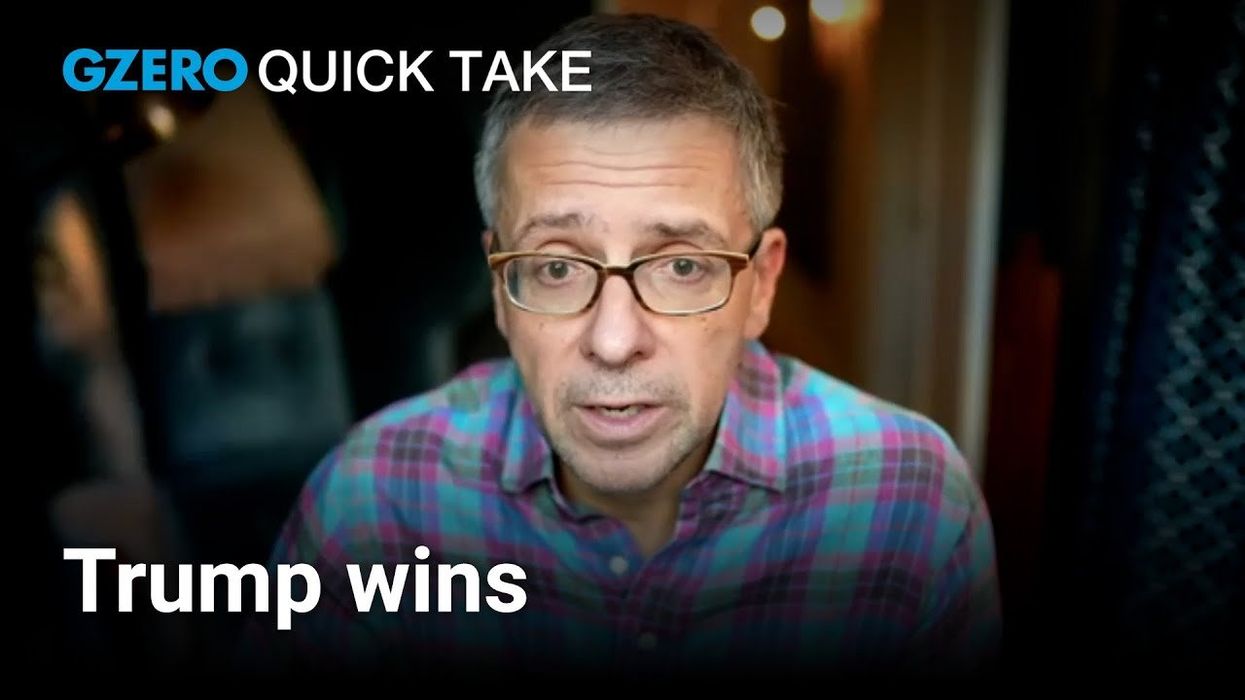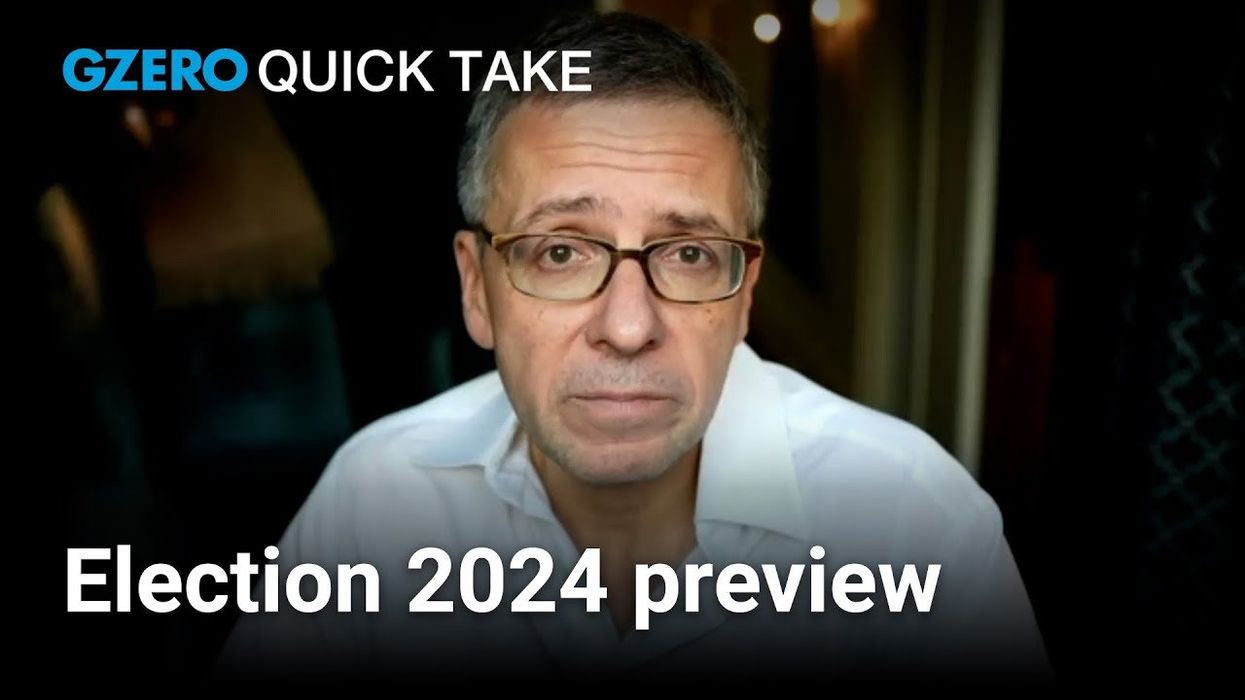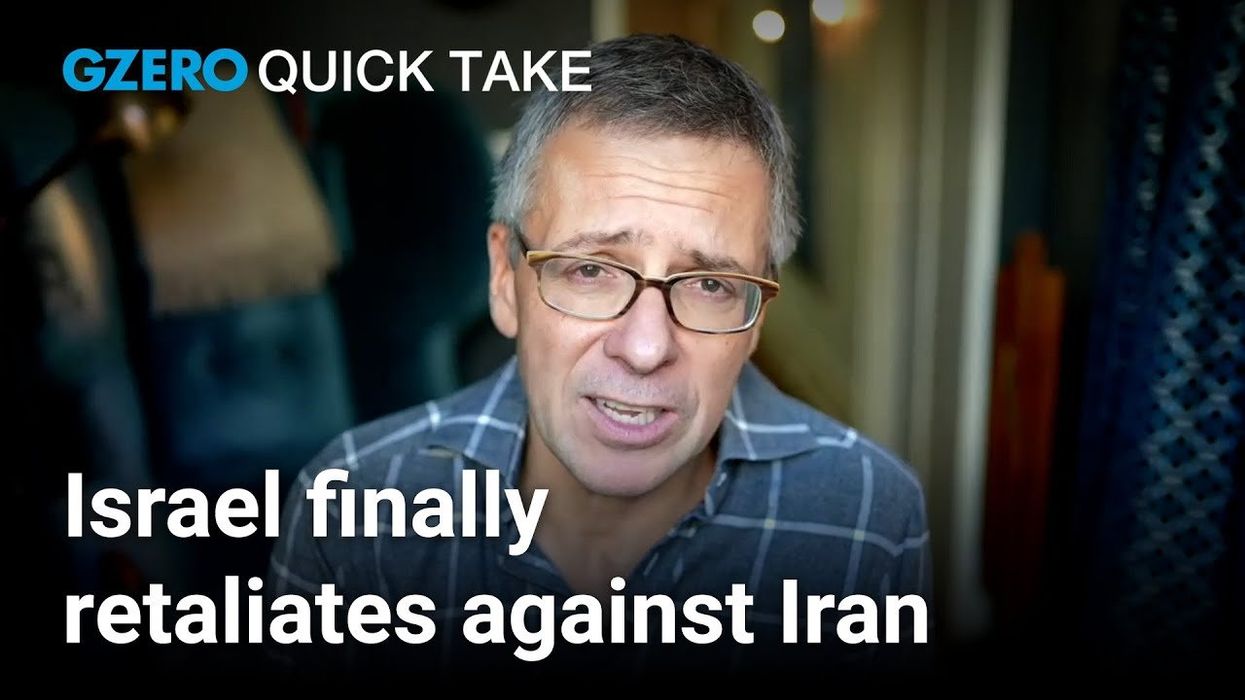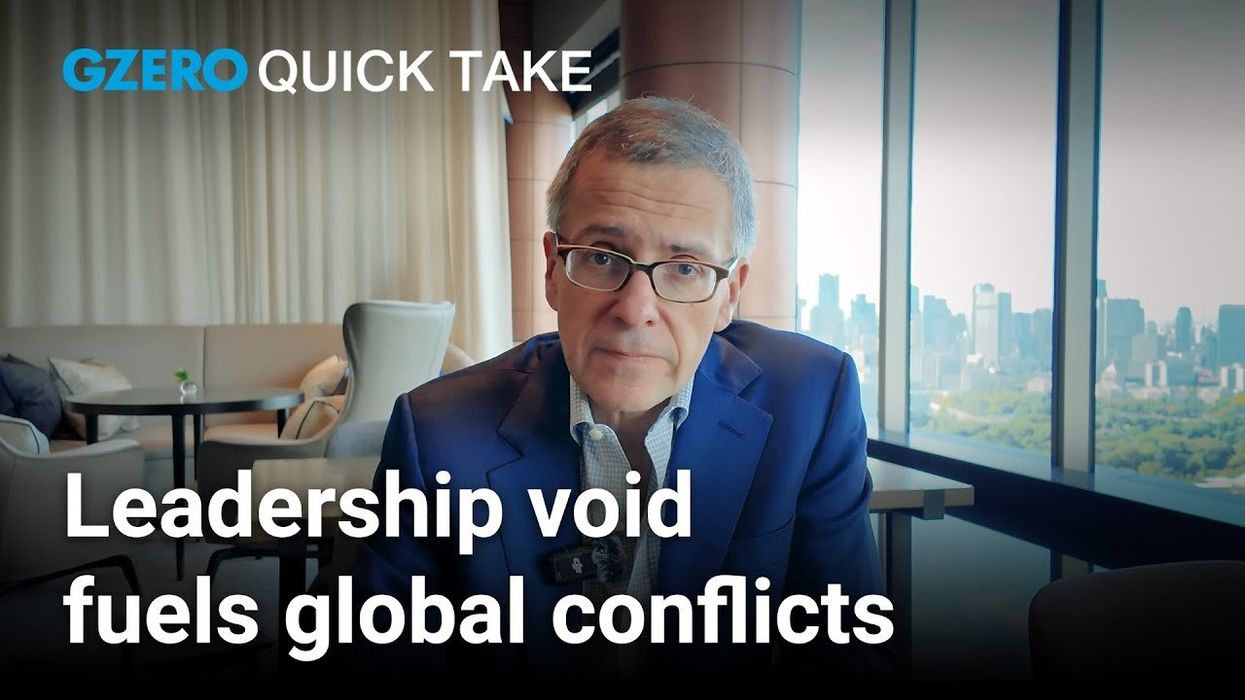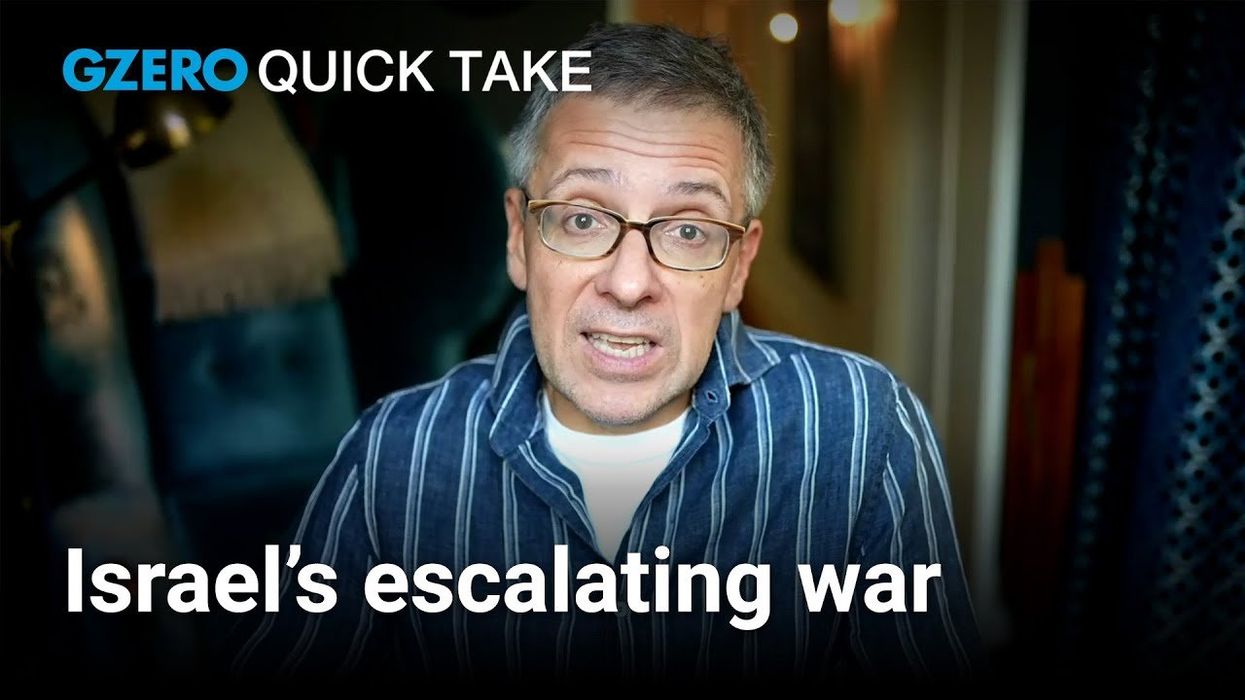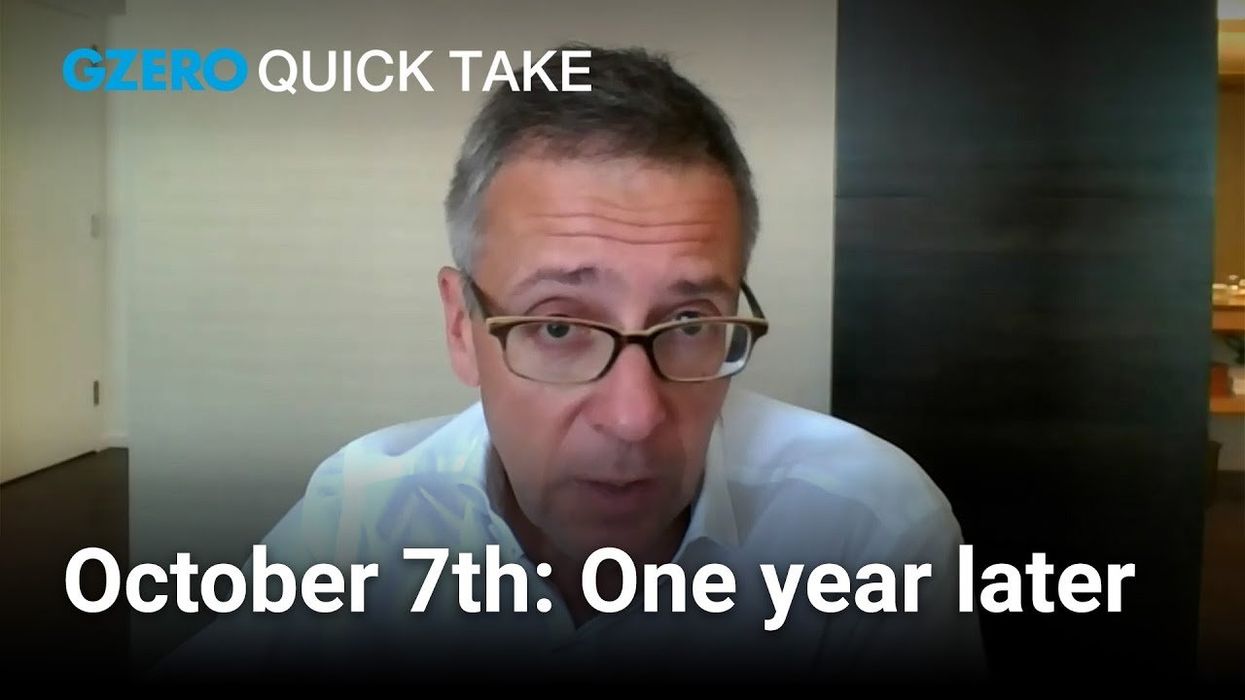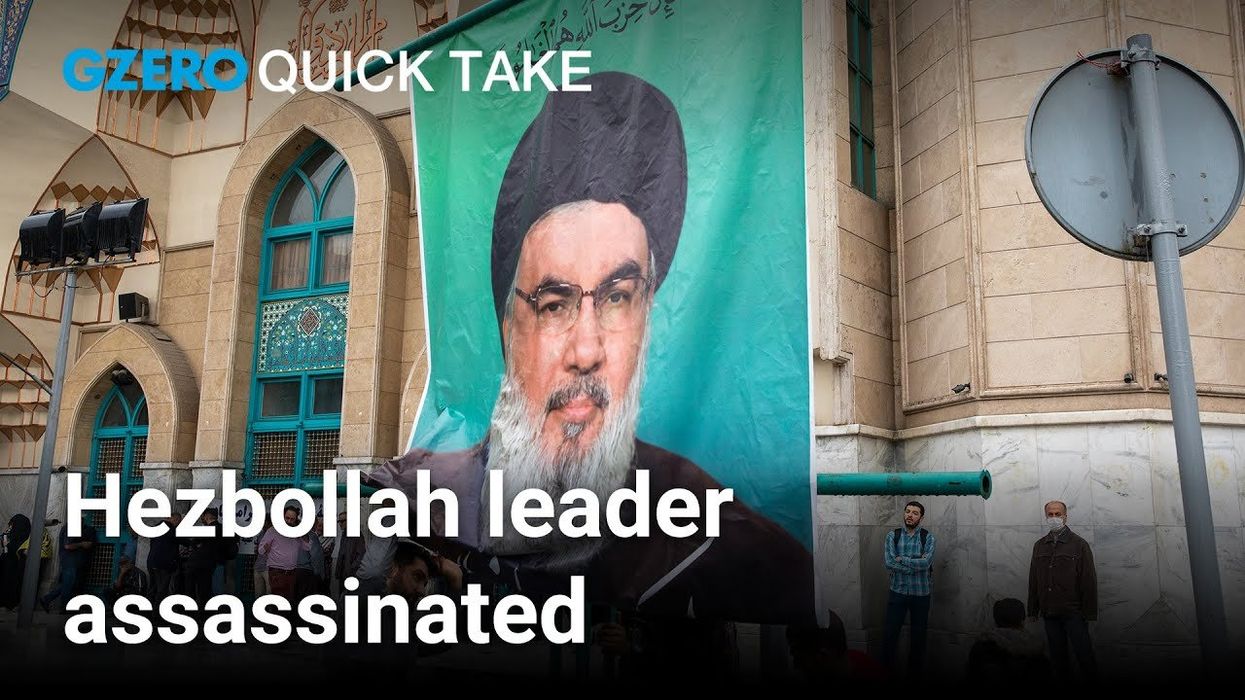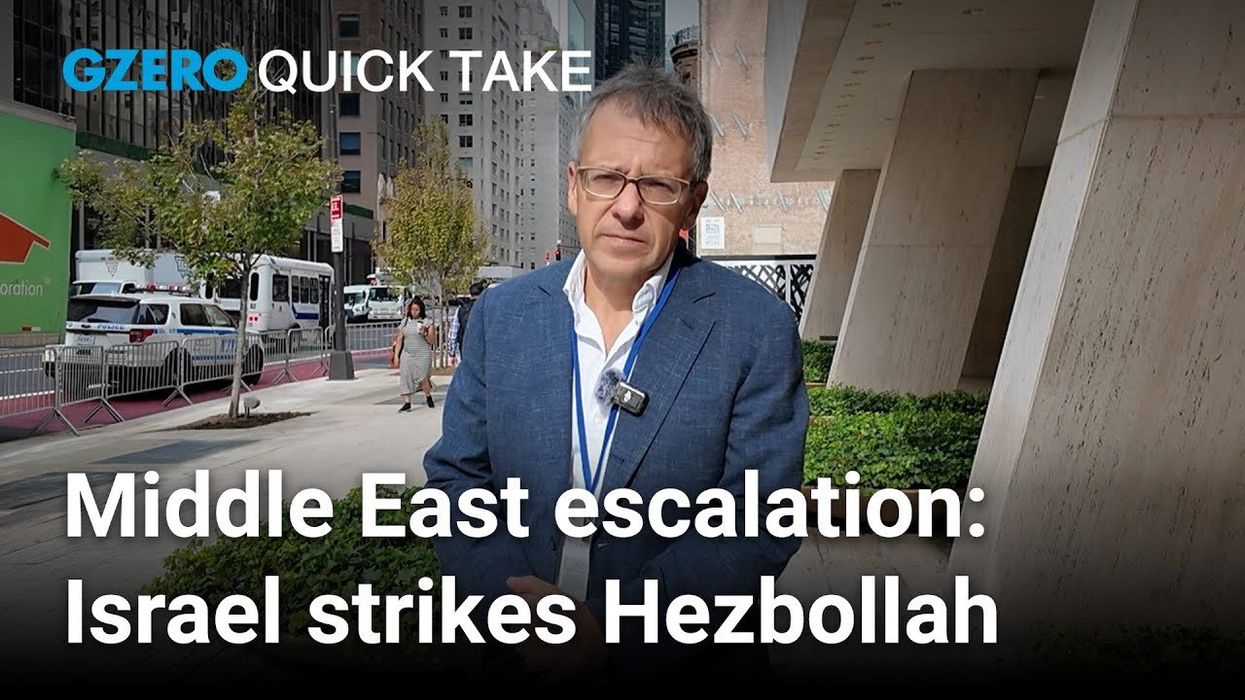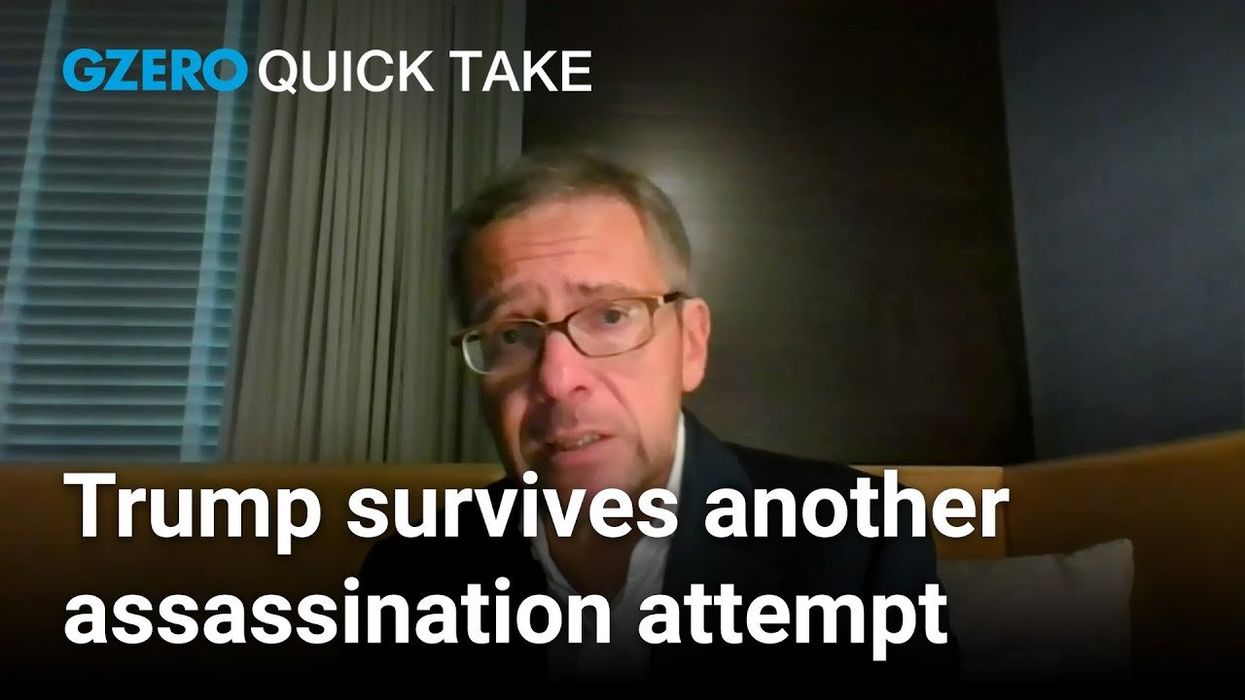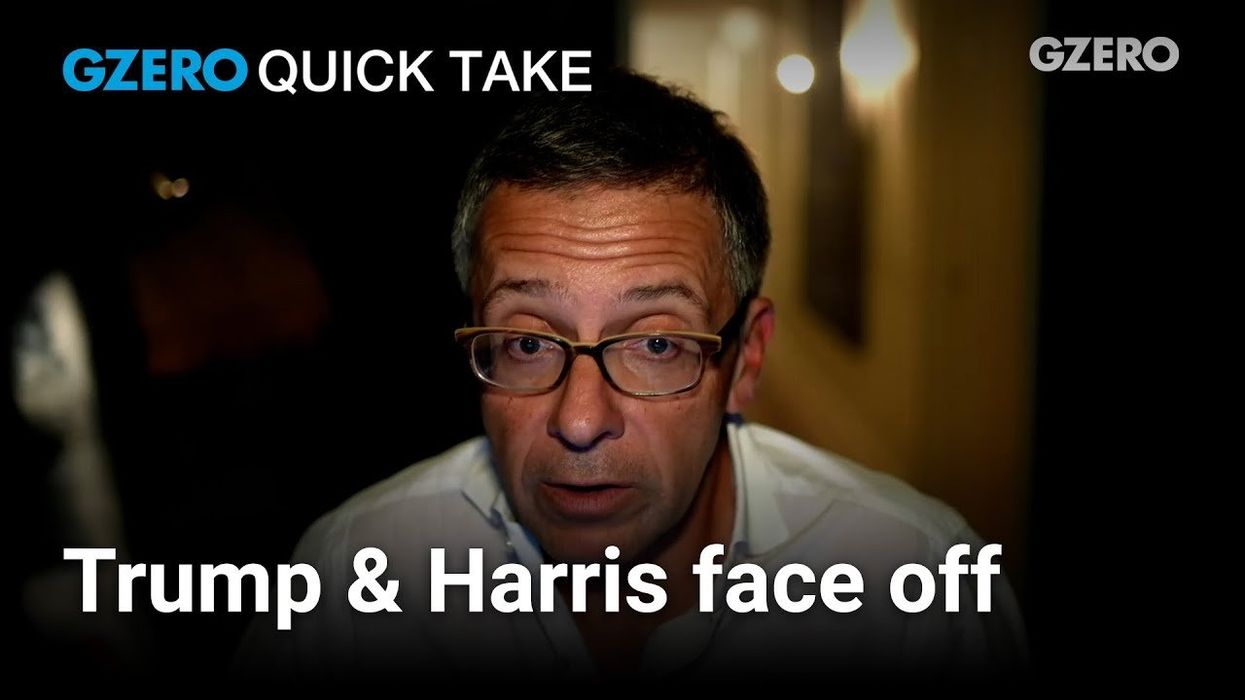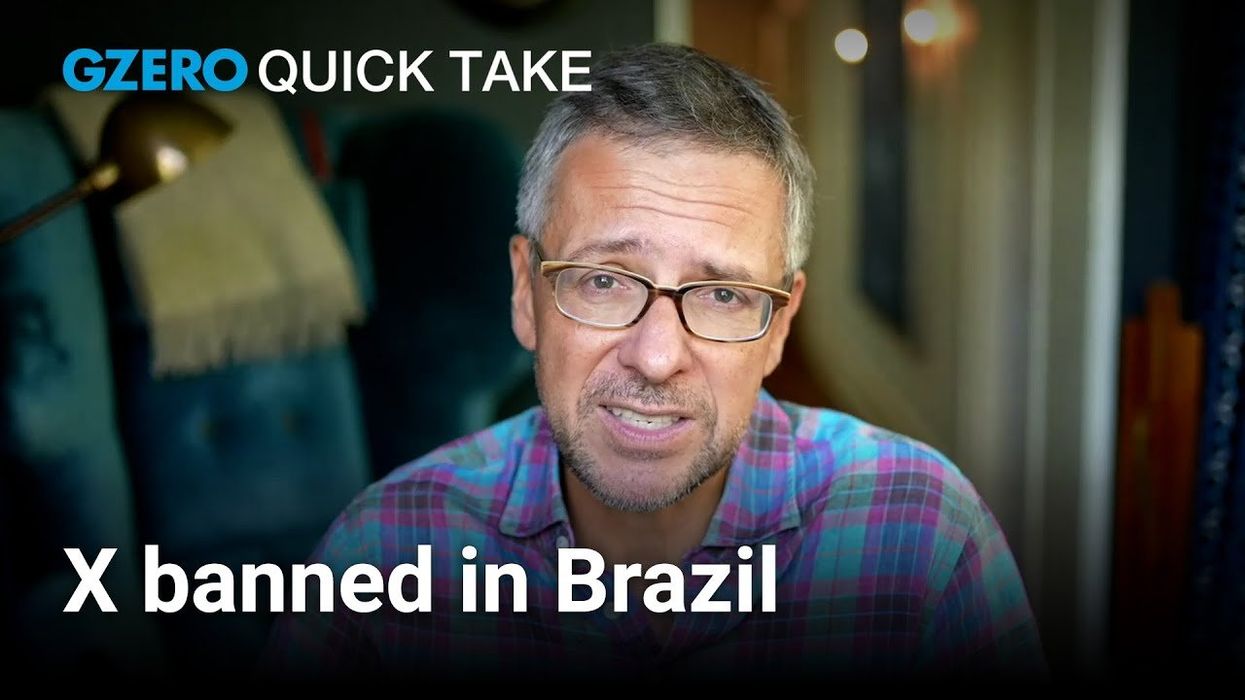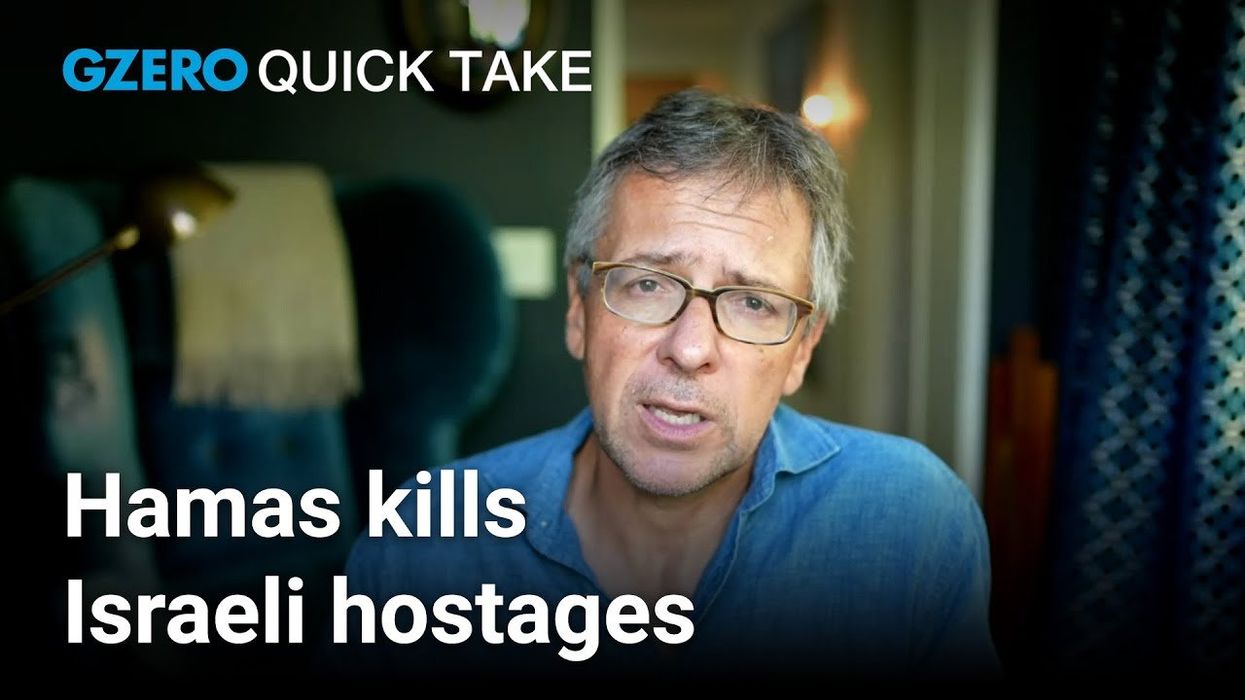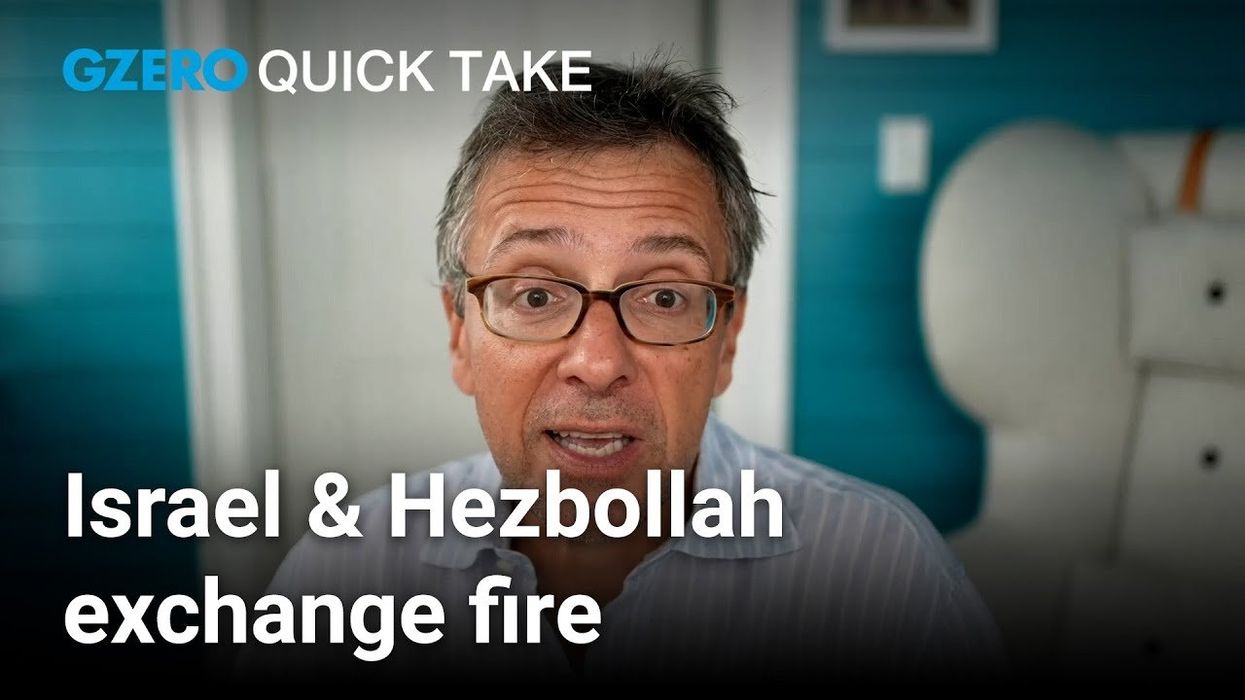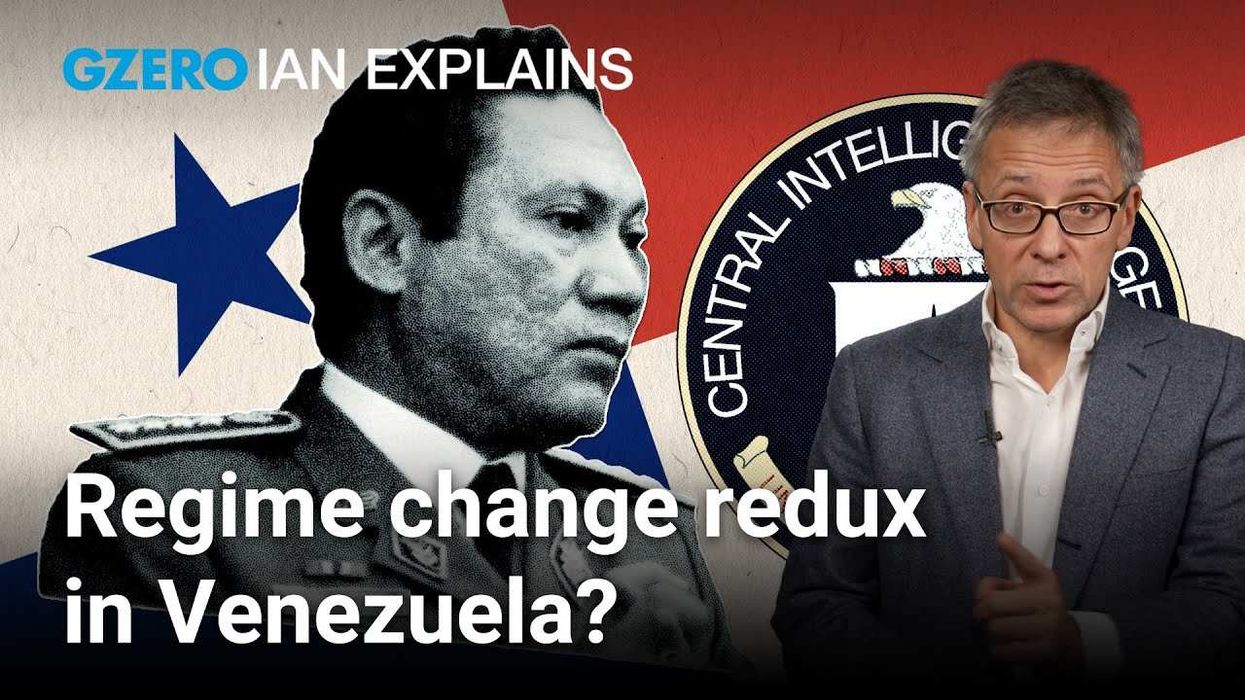VIDEOSGZERO World with Ian BremmerQuick TakePUPPET REGIMEIan ExplainsGZERO ReportsAsk IanGlobal Stage
Site Navigation
Search
Human content,
AI powered search.
Latest Stories
Start your day right!
Get latest updates and insights delivered to your inbox.
Ian Bremmer's Quick Take: Hey everybody. Ian Bremmer here and a happy Monday to you. A Quick Take to kick off your week. Wanted to talk latest on the Russia War.
Seen both sides, significant new attacks. From the Ukrainians, a drone successfully hitting an office tower in Moscow. From Russia, a drone attacking a grain storage and infrastructure facility right on Ukraine's Romanian border. The Ukrainians wanting to show Russia that they can continue to hit deep inside the country, even right at the capital. The Russians wanting to show that they can and will cripple Ukrainian agricultural capabilities now that they have stepped out, the Russians have stepped out of the Black Sea grain deal. Both of these things showing that 500 plus days in the war is not over. It's continuing to cause grave damage to both populations and both also showing that there's very little substantial progress either towards victory of one side, defeat of the other or towards a ceasefire and a breakthrough in negotiations.
Given that state of play, and given that we just had a Vilnius summit, NATO summit that showed that the countries are together and they're providing strong levels of ongoing support for the Ukrainians, that's not going to fall apart anytime soon. But meanwhile, the Russians are defending themselves capably in the front lines against Ukrainian counter offensive, which is not going as well as certainly the Ukrainians or NATO had hoped a couple of months ago before it started. I wanted to look at policy because what US and NATO policy towards the Russia, Ukraine fight is and isn't is sometimes misstated.
NATO and the United States, first and foremost are trying to help defend Ukraine and help them get their land back, certainly the territory that has been taken since February 24th. They have done a pretty good job of that. Certainly the Ukrainians are far more capable in terms of their defenses going forward, and much of the territory that was initially taken by the Russians has now been regained by Ukraine. Certainly not all of it, and again, not very much over the last couple of months, but the Russians do not control most of the territory that they have illegally annexed over a few months ago. And of course, all of the territory they initially took in the north and towards Kyiv and the Northeast, that the Ukrainians have removed them from completely back to the original borders. Secondly, the US and NATO are trying to make sure that Russia doesn't want to do it again, that they understand that this was a mistake, whether or not they admit it as such and that such an attack going forward would be even more so.
In other words, they don't want the Russians to think that they can wait out and have a second bite of this apple. Now so far they seem pretty successful there as well. That's why you continue to have efforts to talk about long-term Ukrainian security guarantees, including eventually a pathway into NATO. But short of that, and before that, commitments that the G-7 will all continue to provide cyber defenses and equipment and training and intelligence for the Ukrainians, all of which is intended to bolster that policy. And then finally want lessons for other countries, notably China, to them, that if you were thinking of invading Taiwan, if you were thinking of attacking territory that really matters to the West, think again, there will be serious consequences. You'll be punished for that. It'll hurt you militarily, it'll hurt you economically. And I think that on that policy as well, there has been so far a fair amount of success.
Now, what the policy is not. It is not a policy to remove Putin from office. It is not a policy of regime change. It is also not a policy to destroy Russia. Russia is a federation. There are different autonomous republics and regions with different nationalities. This is not an intention to do to the Russians what happened to the Soviet Union in the late eighties, culminating in the collapse in 1991. Also very importantly and not discussed very often, it's not an effort to cut off global markets from Russia. I hear a lot, look at, and I put out those numbers myself. Look at how much oil the Indians are buying from Russia. Look at how much the Chinese are now buying from Russia. The American policy, the NATO policy is that India and China should buy that oil at a discount from the Russians. The alternative would be that the markets would be crippled.
The alternatives would be a massive spike in disruptions in supply chain, a major recession that Biden doesn't want and that frankly nobody in NATO wants. So even though you won't see NATO leaders saying, we're so happy the Indians are buying all of this oil, the reality is they are. It's cheaper. The Russians are getting less for it than they would in a properly functioning global market had they not invaded Ukraine. And then the Indians are actually doing more refined product, value add for them that is being exported to Europe so the Europeans can continue to have their economy run. Are the Europeans still essentially consuming a lot of Russian oil? Sure they are. Are the Europeans ending up getting a whole bunch of food from Russia? Yeah, and so is Africa, and so are other countries around the world.
And it's very annoying that the food and fertilizer deal has been unilaterally broken by the Russians, and now the Ukrainians will not be able to profit from their food and fertilizer industry, and it's going to hurt a lot of African nations in particular, but Russia will still be able to export a lot of that food. And again, given the importance of those commodities to global markets, that's not going to change anytime soon. The reason I mention this is because at some point the war will be over, at some point there will be a ceasefire, hopefully, as the Ukrainians can take as much of their land back as was stolen from them as possible, and hopefully with very strong and defined and ongoing support from the EU, from the United States, from the G-7, from NATO, that will allow Ukraine to reconstruct, allow them to join the EU, allow them eventually even to join NATO, and hopefully there will also be strong lessons that are maintained by the Russians, by the Chinese, by others around the world that the G7 is cohesive, will respond to breaking of the rule of law, at least in those cases where countries are strategically important to NATO and the G-7.
I'd like to say to all countries around the world, that would certainly be the proper international law response. It would also be the proper human response. I don't think that we are there, but nonetheless, the basic intentions of these policies are so far looking to be pretty strong. The question of course is what do you do beyond that? Because the consequences of Putin invading is that he has screwed up his own country. The consequences of Putin invading is that Prigozhin, who was this very loyal guy that was providing all sorts of paramilitary services for dictatorships across the Middle East and Africa, suddenly had to redeploy to Ukraine because the defense ministry and the regular forces did so badly, his forces got eaten up, and now he's become enemy number one for the Russians, and yet is still walking around in Belarus. That destabilizes Russia. It's not American policy, but it is a knock on consequence of the failure of the invasion and the consequences of the invasion.
What that means is that dealing with the Russians long term is something the Americans are going to have to think a lot more about. You can get the war in Ukraine eventually over and still have a massive problem with a nuclear-armed Putin whose country is much more destabilized, and yet the US has no interest in having a Russia massively destabilized. In that regard, America shares interest with almost everyone in the world, certainly the Chinese, the Indians, the entire Global South. Nobody wants nuclear war. Nobody wants a rogue state like Russia to become destabilized and more risk acceptant. That would undo so many of the proper lessons that hopefully are finally being learned by a lot of countries on the basis of the late, but nonetheless, strong response to the Russian invasion.
So something to spend more time thinking about, especially as we talk about, for example, Putin as a war criminal, which certainly is true, and on the other hand, he'll never be tried for it. And the ability to deal with a war criminal makes it a lot harder long term for Europe, for the United States to have a stable relationship with a post-Ukraine war Russia. How do you square that circle? And if you don't, what kind of a world are you living in? What kind of greater risks are you imputedly willing to tolerate? Something we're going to talk about a lot more.
Anyway, that's it for me on a Monday. Hope everyone's doing well and I'll talk to you all real soon.
Keep reading...Show less
More from Quick Take
Quick Take
Dec 02, 2025
Europe divided as US pushes Ukraine-Russia peace deal
November 24, 2025
Trump escalates sanctions against Russia
November 10, 2025
Is Abu Dhabi becoming the global capital of AI development?
November 02, 2025
What the Trump-Xi meeting means for US-China relations
October 30, 2025
Trump’s East Wing demolition, Binance pardon, and tariffs on Canada
October 27, 2025
Trump brokers peace: Hostages freed and guns fall silent in Gaza
October 13, 2025
Trump's role in brokering Israel-Hamas deal
October 09, 2025
America’s short-term wins vs. long-term risks
October 06, 2025
Israel is facing real consequences over Gaza annexation plans
September 29, 2025
Is Israel risking global isolation over Gaza?
September 22, 2025
Charlie Kirk's assassination will make things worse in the US
September 15, 2025
Russia-Ukraine war escalation
September 08, 2025
China’s push for a new world order
September 02, 2025
Is the US preparing to strike Venezuela?
August 27, 2025
Is American capitalism still capitalism?
August 25, 2025
Zelensky, Trump, and NATO: A united front on Ukraine?
August 18, 2025
Trump and Putin to meet in Alaska to discuss Ukraine
August 11, 2025
US government rescinds West Point role for former cyber director
August 04, 2025
US-EU trade deal marks a win for Trump
July 28, 2025
The US, China, and the critical minerals question
July 21, 2025
Epstein conspiracies divide Trump's MAGA base
July 14, 2025
US-Brazil relations in crisis
July 10, 2025
Elon Musk vows to start a new political party
July 07, 2025
What Zohran Mamdani’s win really signals for US politics
June 30, 2025
Iran's retaliation shows strategic weakness
June 23, 2025
US enters war with Iran: What comes next?
June 22, 2025
Iran looks to negotiate ceasefire
June 16, 2025
Elon vs. Trump: Billionaire fallout goes public
June 06, 2025
Elon Musk steps down from Trump administration
May 29, 2025
Trump's weekend of geopolitical success
May 12, 2025
Can Trump and Carney reset US-Canada relations?
May 07, 2025
Trump’s ‘less is more’ message is un-American
May 05, 2025
Ian Bremmer on Trump's first 100 days
April 28, 2025
Trump’s America: A kleptocracy but not a police state
April 23, 2025
Inside the Harvard-Trump showdown
April 21, 2025
Can the US win by undoing globalization?
April 14, 2025
Who benefits from Trump's tariff wall?
April 07, 2025
Trump's tariffs & the end of globalization
April 03, 2025
Leaked Signal chat shows Trump team's mindset
March 26, 2025
What Trump team's war plans leak revealed
March 25, 2025
Is Europe in trouble as the US pulls away?
March 24, 2025
Putin-Trump Ukraine call is a small win for both sides
March 18, 2025
What will Trump offer Putin in Ukraine ceasefire talks?
March 17, 2025
Ukraine ceasefire deal now awaits Putin's response
March 11, 2025
Can Europe broker a Ukraine ceasefire?
March 03, 2025
What Trump-Zelensky fallout means for Ukraine war
March 01, 2025
Why the US-Ukraine minerals deal changed
February 26, 2025
Germany's close election limits its ability to lead Europe
February 24, 2025
Ukraine hopes for Europe's help as US negotiates with Russia
February 18, 2025
JD Vance stuns Munich conference with critique on European democracy
February 14, 2025
Trump-Putin chat over Ukraine "deeply" worries Europe
February 13, 2025
What is Trump's Gaza playbook?
February 10, 2025
Why cutting USAID will hurt American foreign policy
February 05, 2025
Why is Trump starting a trade war with Canada?
February 02, 2025
How Trump's assertive foreign policy impacts international relations
January 27, 2025
Trump's Davos address sets up big shifts in US strategy
January 24, 2025
From Davos: How global leaders are grappling with Trump’s return
January 20, 2025
Ian Bremmer on the forces behind the geopolitical recession
January 17, 2025
What Greenlanders might want from a deal with Trump
January 13, 2025
New Year's Day terror attacks highlight America's divisions
January 03, 2025
MAGA, the American Dream and immigration
December 27, 2024
What Trump's Panama Canal threats reveal about today's geopolitics
December 23, 2024
A look back at the Top Risks of 2024
December 22, 2024
What's next for South Korea after President Yoon's impeachment?
December 16, 2024
Ian Bremmer on Assad's fall
December 08, 2024
Why South Korea's president declared martial law
December 03, 2024
Syrian rebel forces take Aleppo
December 01, 2024
Putin's strategy in Ukraine ahead of Trump's return
November 25, 2024
Global leaders scramble to align with Trump
November 18, 2024
Trump's plans for policy & personnel
November 12, 2024
Ian Bremmer on Trump’s win
November 06, 2024
Ian Bremmer on the 2024 US election ahead
November 04, 2024
After Israel's response to Iran, what's next?
October 28, 2024
A global leadership void and ongoing wars
October 21, 2024
Israel's next move
October 14, 2024
How October 7th changed Israel and the Middle East
October 07, 2024
Israel strikes: Why Hezbollah remains silent
September 30, 2024
Israel vs. Hezbollah
September 24, 2024
Ian Bremmer on Trump second assassination attempt
September 16, 2024
Harris wins debate
September 11, 2024
Brazil's X ban becomes a rallying cry for Bolsonaro
September 09, 2024
Israelis push Netanyahu for cease-fire after Hamas kills hostages
September 03, 2024
Israel & Hezbollah: What to expect next
August 26, 2024
GZERO Series
GZERO Daily: our free newsletter about global politics
Keep up with what’s going on around the world - and why it matters.

